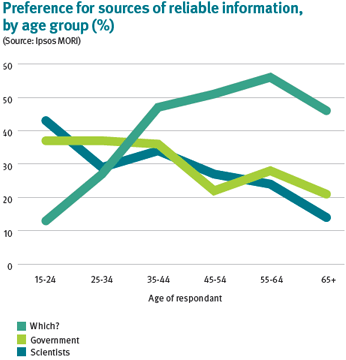New research by Ipsos for the
CBI shows that if manufacturers, government and retailers want to increase takeup of low carbon products which can help tackle climate change, they will need to talk in terms of 'energy efficiency' and demonstrate how low carbon can help reduce the running costs of products.
Ipsos carried out 4 focus groups and 8 filmed interviews with consumers, representing different ages and lifestages in July/August 2010. We discussed purchase decisions around cars, electronic goods, washing detergents and white goods as well as their awareness and views of low carbon, energy efficiency, and product labelling around these issues. We then verified the hypotheses from these groups in 1,988 quantitative
face-to-face interviews conducted using CAPI machines as part of an
Omnibus survey. Data are weighted to be nationally representative. The weighted total is 1992 interviews and the fieldwork dates were 17th - 23rd September 2010.
Both strands of research uncovered that the majority of consumers do not make a natural link between energy efficiency and tackling climate change. When products are labelled 'energy efficient', less than a third identify the link between climate change and energy efficiency (30%). When products are labelled 'low carbon', however, a greater number could see the link between low carbon and helping to tackle climate change (nearly half of survey participants, 48%). In the qualitative research too, we heard consumers struggling to understand how their personal energy usage related to the production of emissions which might contribute to climate change.

When considering new products in certain categories (such as washing machines and cars) energy efficiency is a well established discourse among consumers. Other product categories need to find ways to explain energy efficiency. While over half (53%) of respondents took energy efficiency into account in purchasing a fridge, only a quarter (28%) considered it in buying a home. There is an appetite among consumers for a tangible, relevant discussion of, for example, how reducing running costs of a product through energy efficiency might save them money in the longer term.
The research also uncovers that some products are naturally more suited to messages about energy efficiency due to the ease with which consumers can associate increased cost with increased energy consumption.
As a result of this research, the CBI recommends in its report that energy efficiency should be leveraged wherever possible,to help get consumers on board with a low carbon agenda - and some categories will be 'quicker wins' than others.
The research also uncovered that different age groups trust different messengers when it comes to hearing messages about energy efficiency. The government, consumer publications like Which?, and scientists are all favoured by different age groups.






